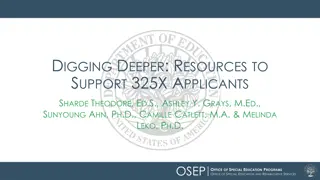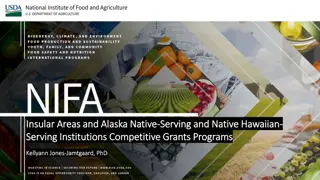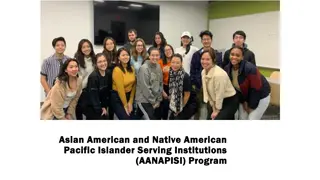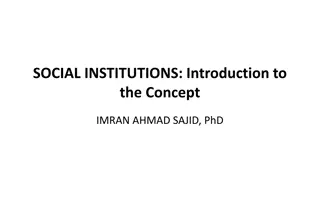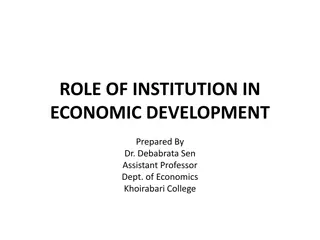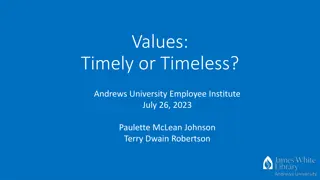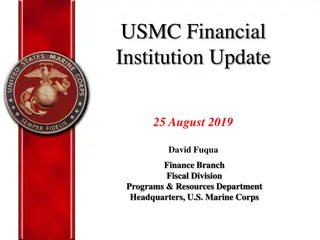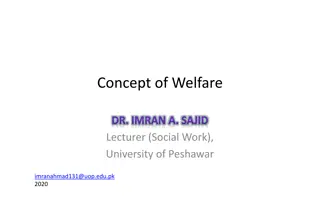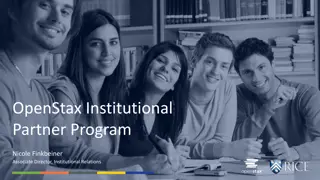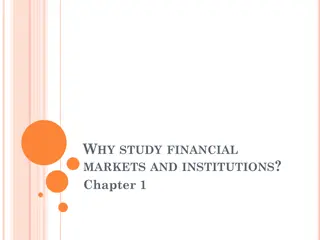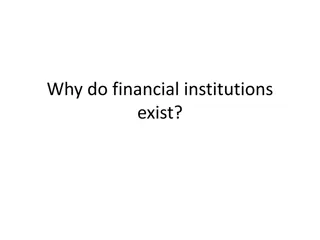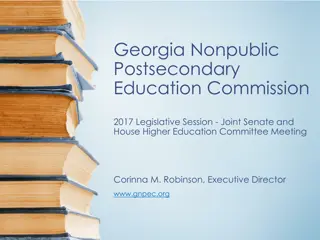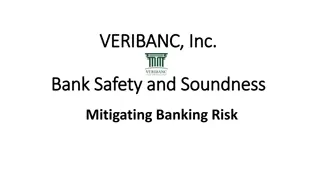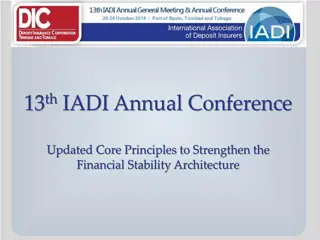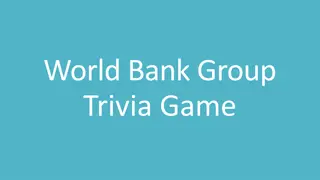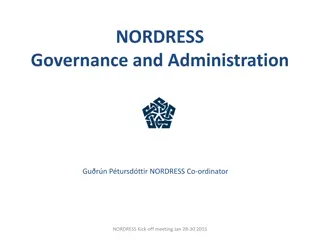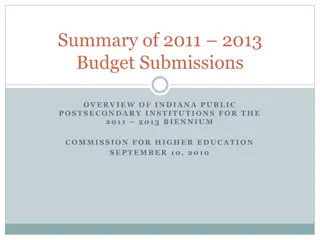Maqasid al-Shariah-Based Performance Evaluation Index for Islamic Social Finance Institutions
This study focuses on developing a performance evaluation index for Islamic social finance institutions (ISFIs) based on Maqasid al-Shariah to better measure their performance beyond just financial aspects. The aim is to analyze how far ISFIs have accomplished Maqasid during their operations through
1 views • 22 slides
Role of Central Banks in International Financial Institutions
Central banks play a crucial role in the interconnectivity with international financial institutions like the Asian Development Bank (ADB) and the International Monetary Fund (IMF). These institutions aim to promote economic and social development, ensure exchange rate stability, provide financial a
1 views • 18 slides
Why must students opt for universities in the U.K. instead of other countries
he United Kingdom is home to some of the world\u2019s most prestigious educational institutions. Oxford, Cambridge, and University College London are exceptional educational institutions. The Q.S. World University Rankings include 76 UK-based institutions.
0 views • 3 slides
MedLink Healthcare Job Posting pdf
\"MedLink is a groundbreaking platform dedicated to connecting healthcare professionals and institutions, transforming healthcare hiring. Our exclusive job platform serves as the ultimate bridge between jobseekers and a wide range of healthcare institutions, including hospitals, clinics, and provide
0 views • 8 slides
Enhancing Diversity in Special Education Programs: A Focus on HBCUs, TCCUs, and MSIs
This collection of resources highlights the importance of increasing diversity in special education programs by supporting Historically Black Colleges and Universities (HBCUs), Tribal Colleges and Universities (TCCUs), and Minority-Serving Institutions (MSIs). The content covers the significance of
1 views • 26 slides
NIFA Competitive Programs for Insular Areas and Alaska Native Serving Institutions
NIFA provides competitive grants for agricultural research, education, and extension programs in insular areas and Alaska Native serving institutions. Topics covered include advanced technologies, food science, animal health, environmental sustainability, business and economy, farming practices, and
2 views • 13 slides
Overview of AANAPISI Program in the United States
The Asian American and Native American Pacific Islander Serving Institutions (AANAPISI) Program aims to support institutions with a minimum of 10% Asian American and Native American Pacific Islander undergraduate enrollment. Currently, there are 54 funded AANAPISI institutions across 16 states and t
0 views • 13 slides
Understanding Institutional Theory and Organizations
Explore the concept of institutional theory, which focuses on the stability and change of institutions and organizations. Learn about institutionalization, deinstitutionalization, and reinstitutionalization, as well as the definitions of institutions and organizations. Discover how institutions like
0 views • 35 slides
Understanding Social Institutions: An Introduction by Imran Ahmad Sajid, PhD
Discover the concept of social institutions through Dr. Imran Ahmad Sajid's explanation. Explore how institutions are established practices that shape complex social forms, distinguishing between institutions and conventions, and their relation to society and culture. Delve into the role of institut
0 views • 14 slides
Role of Institutions in Economic Development: A Comprehensive Analysis
Understanding the significance of institutions in economic development is crucial, as they play a pivotal role in shaping societal, political, and economic relations. Institutions, defined as established customs or practices, act as the rules of the game that structure human interactions. Their qual
0 views • 13 slides
Artha Rin Ain 2003: Special Legislation for Financial Institutions' Debt Recovery
Artha Rin Ain 2003 is a special legislation aimed at enhancing the recovery process of outstanding debts of financial institutions in Bangladesh. The law addresses the shortcomings of previous acts and establishes dedicated courts for the swift resolution of cases involving unpaid claims. It encompa
0 views • 15 slides
Efficiency Analysis of Microfinance Institutions in Papua: A Study by Dr. Muneer Babu
Analysis of the performance and efficiency of Microfinance Institutions in Papua New Guinea, focusing on the provision of financial services to the underbanked population. The study evaluates the resource utilization and efficiency of MFIs, comparing less efficient and highly efficient institutions.
0 views • 18 slides
Understanding the Impact of Globalization on Institutions and Societies
In today's globalizing world, the concept of globalization is reshaping interconnections between countries, challenging established institutions and norms. The process of globalization has far-reaching consequences, affecting areas like politics, economy, and culture. This interconnectedness has blu
0 views • 5 slides
Exploring Core Values in Higher Education Institutions
Unravel the importance of core values in higher education institutions, examining the interplay between organizational culture, decision-making processes, and the alignment of values with faith and professional beliefs. Delve into the diverse types of values, from permission-to-play to aspirational
0 views • 29 slides
Financial Services Institutions Support Value Chain Actors
Financial services institutions play a vital role in supporting various actors within the value chain, including exporters, wholesalers, banks, processors, and non-bank financial institutions. This ecosystem also involves technical training, business support, local traders, private investors, specia
0 views • 30 slides
Leadership for Building World Class Institutions: A Study on Talent Management and Reputation in Higher Education
Delve into the importance of reputation and talent management in higher education institutions, with a focus on developing global mindsets and strategies for building world-class universities. Insights from key figures in education highlight the evolving landscape and necessity for innovative leader
0 views • 20 slides
USMC Financial Institution Update - August 2019 Summary
The US Marine Corps provided an update on their financial institutions featuring key areas like program management, current issues, and a summary of institutions across different locations. Details include management personnel, the number of installations, types of financial institutions, and recent
1 views • 10 slides
Overview of Transfer with Success Act and Regulatory Changes in Maryland
The Transfer with Success Act, passed in 2021, introduced new requirements for public institutions in Maryland related to credit transfers between institutions. Recent stakeholder work groups and regulatory changes have paved the way for implementing these new regulations, aiming to facilitate smoot
0 views • 23 slides
Customer Relations Practices in Academic Institutions: A Focus on Quality Assurance and SERVICOM at UNILAG
Presented by Dr. A.E. Omotayo, this document explores the importance of customer-centric practices in academic institutions, specifically focusing on Quality Assurance and SERVICOM at the University of Lagos (UNILAG). The purpose is to instill a high level of commitment to vision, mission, and value
0 views • 31 slides
Analyzing Systemic Climate Risk in the Financial Sector
This study discusses systemic climate risk in the financial sector by examining the effects of climate risks on financial institutions. It aims to design a market-based framework to assess the vulnerability of financial institutions to climate risks and analyze potential contagion effects. The frame
0 views • 39 slides
Global Multistakeholder Institutions: Key Features and Insights
This content focuses on global multistakeholder institutions (MSIs), their key features, stakeholder influence, decision-making dynamics, and typologies. It also explores the involvement of various entities in MSIs and their impact on critical issues such as food systems, planetary health, and marke
0 views • 10 slides
Spanish Institutions Publishing Options Overview
Understand the eligibility criteria and benefits for Spanish institutions under the agreement with Elsevier. Learn how corresponding authors affiliated with Spanish institutions can avail discounts and APC coverage, and the role of institutional librarians in the OA platform. The process from articl
0 views • 17 slides
Averting Dispensational Departure: Corrective Measures for Theological Institutions
A comprehensive study explores the departure of graduates from dispensational institutions, analyzing influences, alumni perceptions, and proposing recommendations to prevent theological departures. The research highlights key findings and phases of the study, shedding light on solidly dispensationa
0 views • 24 slides
Understanding Social Institutions and Welfare in Human Society
Social institutions play a crucial role in addressing social problems and meeting the basic needs of human societies. Concepts of welfare and institutions like family, education, economy, and politics are explored. Welfare is described as traveling smoothly on the road of life, derived from the root
0 views • 21 slides
The Role of Guarantee Institutions in Supporting European SMEs
Guarantee institutions play a crucial role in facilitating access to finance for SMEs in Europe. With 46 members across 31 European countries, these institutions provide new guarantee production, support SMEs with outstanding guarantee volumes, and offer dedicated products for sustainable and digita
0 views • 16 slides
The Vital Role of Religious Institutions in Supporting Immigrants
Religions and immigration are interlinked in modern societies, where religions play a significant role in providing services, defending rights, and supporting the social cohesion of immigrants. Mainstream religious institutions serve as key actors in offering assistance, advocating for migrant right
2 views • 14 slides
Understanding Banking Institutions and Their Types
Banking institutions play a vital role in the financial sector by mobilizing public savings and providing funds to meet various financial needs. Commercial banks, investment banks, co-operative banks, and central banks are some examples of banking institutions. Scheduled banks enjoy certain benefits
0 views • 17 slides
Strategies for Effective OER Implementation in Institutions
The OpenStax Institutional Partner Program aims to increase OER usage in institutions, providing structured programs and support. Strategies include proactive approaches, direct and indirect tactics for engaging faculty, and leveraging experience from multiple colleges and universities. The program
0 views • 25 slides
Selecting Transferable Gen Ed Courses for Ohio Public Institutions
Stakeholders preparing the Transferability Strategic Plan in Ohio emphasize the importance of selecting transferable General Education courses from proprietary to public institutions. This involves identifying widely taken Gen Ed courses and using enrollment data from Ohio public institutions to det
0 views • 17 slides
Understanding the Significance of Financial Markets and Institutions
Studying financial markets and institutions is crucial as it facilitates the efficient transfer of funds, promotes economic growth, impacts personal wealth, influences business decisions, and plays a significant role in determining interest rates. Debt markets, including bond markets, enable borrowi
0 views • 15 slides
Understanding Why Financial Institutions Exist
Financial institutions exist to provide crucial services like intermediation, risk management, and facilitating economic activities by connecting savers and borrowers. The global financial structure involves various institutions like banks, insurance companies, and securities markets. Key facts incl
0 views • 45 slides
Georgia Nonpublic Postsecondary Education Commission Overview
Georgia Nonpublic Postsecondary Education Commission (NPEC) is the state agency in charge of regulating private postsecondary institutions in Georgia and out-of-state institutions operating within Georgia. Established in 1990, NPEC ensures educational and financial stability, maintains standards, an
0 views • 10 slides
Understanding VERIBANC Rating System for Financial Institutions
The VERIBANC rating system provides a simple two-part color code and star classification to assess financial institutions' current standing and future outlook. It considers factors like capital strength, asset quality, management ability, earnings sufficiency, liquidity, and market risk sensitivity.
0 views • 19 slides
Key Aspects of Crisis Management and Preparedness in Financial Institutions
This presentation delves into the critical components necessary for reducing the Too Big to Fail problem in financial institutions. It emphasizes the importance of comprehensive recovery and resolution planning to prevent government bailouts and mitigate losses effectively. The Key Attributes of Eff
1 views • 18 slides
Insights into the World Bank Group: Institutions, Sources of Income, and Functions
Delve into the workings of the World Bank Group through an exploration of its institutions, income sources, and functions. Discover how contributions from donor countries, membership dues, bonds, and loan repayments sustain the group. Learn about the five key institutions within the World Bank Group
0 views • 52 slides
NORDRESS Project Governance and Administration Overview
The NORDRESS project involves various entities like the Executive Board, Council, Partner Institutions, and Supporting Institutions for day-to-day management, decision-making, and overall support. The Project Manager from the University of Iceland plays a central role, coordinating activities and li
0 views • 13 slides
Understanding Political Institutions and Their Significance in Governance
Dr. R.E.V. Gyampo, a lecturer in the Department of Political Science at UG College of Education, explains the concept of institutions, distinguishing between formal and informal ones. He emphasizes the importance of rules within institutions for predictability and behavior governance. The discussion
0 views • 14 slides
Pursuing Quality, Access, and Affordability in Higher Education Institutions
This research delves into how six institutions tackle the challenges of enhancing quality, ensuring access, and maintaining affordability in higher education. It explores the concept of the iron triangle and how institutions can achieve threefold gains by improving quality, expanding access, and low
0 views • 16 slides
Budget Submissions Overview of Indiana Public Postsecondary Institutions (2011-2013)
Detailed analysis of budget submissions for Indiana public postsecondary institutions from 2011-2013, including state appropriations, operating expenses, debt services, and total operating submissions funded by state funds. The data covers various institutions such as Ball State University, Indiana
0 views • 19 slides
National Initiatives for Higher Education Institutions: Har Ghar Tiranga & COVID Vaccination Amrit Mahotsav
Honorable Prime Minister has initiated two important campaigns for Higher Education Institutions - Har Ghar Tiranga and COVID Vaccination Amrit Mahotsav. The Har Ghar Tiranga campaign emphasizes creating awareness, organizing events, and promoting patriotism amongst students and faculty. On the othe
0 views • 5 slides




